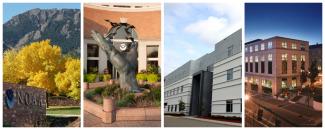
The hard work of science is rarely done alone and NCEI is no exception. NOAA partners with academic and nonprofit institutions throughout the country to conduct research and perform tasks that support its mission and goals.
Known as Cooperative Institutes, these partnerships are often colocated with NOAA research laboratories, creating a strong collaboration between scientists and their university counterparts. Those Cooperative Institutes not colocated within a NOAA lab often serve research communities and programs.
NOAA’s partnerships with academic institutions allow for sponsorship of students through fellowships. Thus, Cooperative Institutes serve an additional important function—they help educate and train the next generation of the nation's scientific workforce.
Currently, NOAA supports 17 Cooperative Institutes consisting of more than 57 universities and research institutions across 23 states and Washington D.C. NCEI is grateful to partner with several Cooperative Institutes. Learn more about each of them below.
Cooperative Institute for Satellite Earth System Studies
The Cooperative Institute for Satellite Earth System Studies (CISESS) is a national consortium of academic and nonprofit institutions, with leadership from the University of Maryland College Park (UMD) and North Carolina State University (NCSU).
CISESS in North Carolina is co-located with NCEI in Asheville, North Carolina. CISESS in Maryland is hosted at the University of Maryland’s M Square Research Park in College Park, which is also home to NOAA Center for Weather and Climate Prediction.
CISESS contributes to NOAA’s mission-directed research leading to greater observation, understanding, and prediction of the global Earth System. CISESS provides the capabilities and expertise to improve systems for data access, quality, management, processing, analysis, assimilation, modelling, dissemination, visualization, and stewardship. The grand scientific challenge of CISESS is to enhance our understanding of how the natural components of the Earth system—atmosphere, ocean, land, and biosphere—interact with human activities as a coupled system.
Cooperative Institute for Research in Environmental Sciences
The Cooperative Institute for Research in Environmental Sciences (CIRES) was created in 1967 as a partnership of the University of Colorado Boulder and the ESSA (one of NOAA’s predecessors). And, CIRES holds the distinction of being NOAA’s oldest and largest cooperative institute.
Located in Boulder, Colorado, CIRES employs more than 800 scientists and staff, about half of whom work in NOAA’s David Skaggs Research Center. More than 70 NCEI staff in Boulder are CIRES employees.
CIRES staff at NCEI collaborate closely with their Federal counterparts, working as a team to help achieve our mission.
To learn more about a few CIRES and NCEI collaborative projects, check out these recent projects:
- Understanding Our Ocean with Water-Column Sonar Data
- World Magnetic Model 2020 Released
- A New View of the Sun
Northern Gulf Institute
The Northern Gulf Institute (NGI) is a partnership of six complementary academic institutions addressing important national strategic research and education goals. Mississippi State University leads this collaboration, partnering with the University of Southern Mississippi, Louisiana State University, Florida State University, Alabama’s Dauphin Island Sea Lab, the University of Alabama in Huntsville, and NOAA scientists at various laboratories and operational centers in the Gulf of Mexico. NGI develops, operates, and maintains an increasingly integrated research and transition program, the results of which raise awareness and understanding of the Gulf of Mexico region. NGI researchers, in collaboration with multiple NOAA offices, focus on the issues and resources of the Gulf with many of the tools and protocols transferable to other coastal environments.
NGI scientists and scientific data stewards are working with NCEI to build the long-term coastal data record to support environmental prediction and scientific analyses, and to apply emerging technologies to create integrated products and services.NCEI hosts NGI staff at NCEI is co-located with NGI at our Stennis Space Center location in Hancock County, Mississippi.



